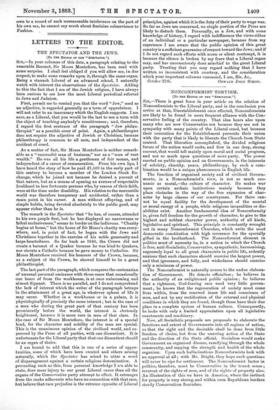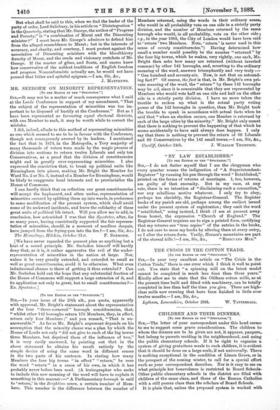NONCONFORMIST TORYISM.
[To THE EDITOR or TEE " SPECTATOR.")
Sts,—There is great force in your article on the relation of Nonconformists to the Liberal party, and in the conclusion you arrive at that, Disestablishment once effected, Nonconformists are likely to be found in more frequent alliance with the Con- servative feeling of the country. That idea bears also upon many who are now Conservative not because they are not in sympathy with many points of the Liberal creed, but because their veneration for the Establishment prevents their union with the party that is likely to liberate the Church from State control. That liberation accomplished, the divided religions forces of the nation would unite, and flow in one deep, strong current, that would tell mainly upon moral and social progress, and not so much upon questions of mere party. The power exerted on public opinion and on Governments, in the interests of sobriety, chastity, peace, philanthropy, by such a com- bination would be a unique phenomenon in English life.
The function of organised society and of civilised Govern- ments, in a Nonconformist's view, is not so much eco- nomic as moral,—the culture of character. He makes war upon certain archaic institutions mainly because they place obstacles in the way of the free expansion of char- acter by large classes of our countrymen. For there can- not be equal facility for the development of the mental or moral energy of a people, while religions inequalities or dis- abilities exist. Another fundamental idea of Nonconformity is, given full freedom for the growth of character, to give to the highest and noblest character power, authority of all kinds, legislative and spiritual. This principle is constantly wrought out in many Nonconformist Churches, which unite the most democratic constitution with high reverence for the specially gifted in the brotherhood. The Nonconformist element in politics must of necessity be, in a nation in which the Church is free, anti-Socialistic, Conservative, sympathetic, harmonising, supremely loyal to all great characters in public life, ardently anxious that such characters should exercise the largest power, and that ignorance, and folly, and wickedness should exercise only a minimum of power.
The Nonconformist is naturally averse to the undue elabora- tion of Government. He detests officialism ; be believes in the authority of an enlightened public opinion ; he believes that a righteous, God-fearing race need very little govern- ment; he knows that the regeneration of society must come from within, from the renewed inner life and conscience of men, and not by any rectification of the external and physical conditions in which they are found, though these have their due place in a complete system of human culture. Consequently, he looks with only a limited appreciation upon all legislative enactments and machinery.
Now, all Socialistic proposals are proposals to elaborate the functions and extent of Governments into all regions of action, so that the right and the desirable shall be done from little freedom of choice, but from the unerring action of the State and the direction of the State official. Socialism would make Government an organised disease, ramifying through the whole community, and sapping the strength and health of the whole organism. Upon such hallucinations Nonconformists look with no approval at all ; with Mr. Bright, they hope such questions will never be ripe for settlement. The Nonconformist factor in politics, therefore, must be Conservative in the truest sense ; reverent of the rights of men, and of the rights of property also. An illustration of this we have in America, where the instinct for property is very strong, and within even Republican borders sturdy Conservatism flourishes.
But what shall be said to this, when we find the leader of the party of order, Lord Salisbury, in his article on "Disintegration " in the Quarterly, stating that Mr. George, the author of "Progress and Poverty," is "a combination of Marat and the Dissenting minister P" I must leave Mr. George's admirers to defend him from the alleged resemblance to Marat ; but in the interests of accuracy, and charity, and courtesy, I must protest against the association of Dissenting ministers with the bloodthirsty ferocity of Marat, and the crude and visionary crotchets of Mr. George. If the master of gibes, and flouts, and sneers knew bow conservative of the noblest traditions of English freedom and progress Nonconformists actually are, he would not have penned that bitter and spiteful epigram.—I am, Sir, &c.,
J. MATTHEWS.







































 Previous page
Previous page